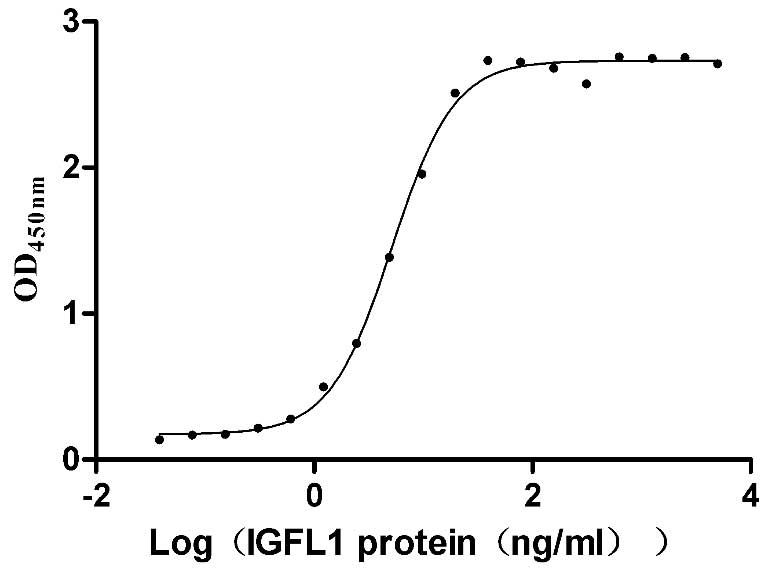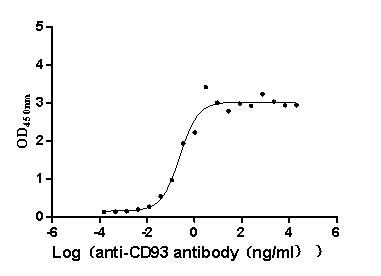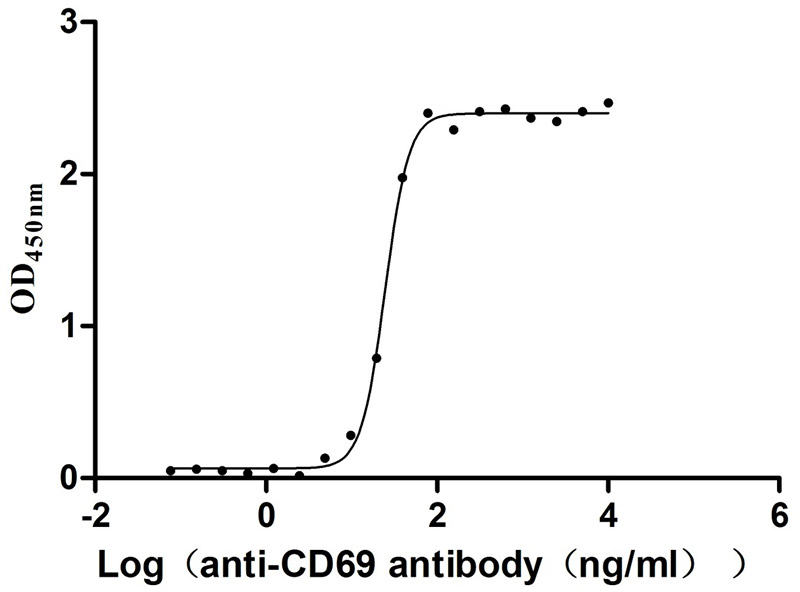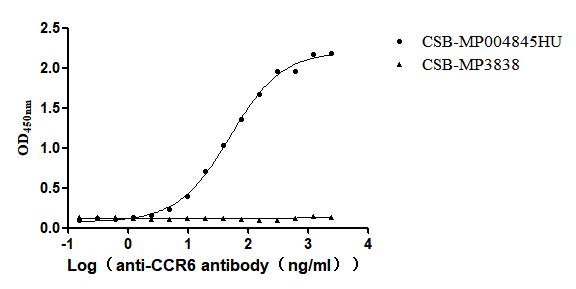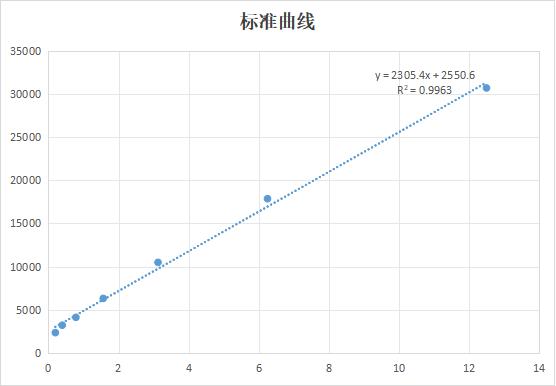Recombinant Mouse Prospero homeobox protein 1 (Prox1)
-
中文名称:小鼠Prox1重组蛋白
-
货号:CSB-YP018757MO
-
规格:
-
来源:Yeast
-
其他:
-
中文名称:小鼠Prox1重组蛋白
-
货号:CSB-EP018757MO
-
规格:
-
来源:E.coli
-
其他:
-
中文名称:小鼠Prox1重组蛋白
-
货号:CSB-EP018757MO-B
-
规格:
-
来源:E.coli
-
共轭:Avi-tag Biotinylated
E. coli biotin ligase (BirA) is highly specific in covalently attaching biotin to the 15 amino acid AviTag peptide. This recombinant protein was biotinylated in vivo by AviTag-BirA technology, which method is BriA catalyzes amide linkage between the biotin and the specific lysine of the AviTag.
-
其他:
-
中文名称:小鼠Prox1重组蛋白
-
货号:CSB-BP018757MO
-
规格:
-
来源:Baculovirus
-
其他:
-
中文名称:小鼠Prox1重组蛋白
-
货号:CSB-MP018757MO
-
规格:
-
来源:Mammalian cell
-
其他:
产品详情
-
纯度:>85% (SDS-PAGE)
-
基因名:
-
Uniprot No.:
-
别名:Prox1; Prospero homeobox protein 1; Homeobox prospero-like protein PROX1; PROX-1
-
种属:Mus musculus (Mouse)
-
蛋白长度:Full length protein
-
表达区域:1-737
-
氨基酸序列MPDHDSTALL SRQTKRRRVD IGVKRTVGTA SAFFAKARAT FFSAMNPQGS EQDVEYSVVQ HADGEKSNVL RKLLKRANSY EDAMMPFPGA TIISQLLKNN MNKNGGTEPS FQASGLSSTG SEVHQEDICS NSSRDSPPEC LSPFGRPTMS QFDVDRLCDE HLRAKRARVE NIIRGMSHSP SVALRGNENE REMAPQSVSP RESYRENKRK QKLPQQQQQS FQQLVSARKE QKREERRQLK QQLEDMQKQL RQLQEKFYQV YDSTDSENDE DGDLSEDSMR SEILDARAQD SVGRSDNEMC ELDPGQFIDR ARALIREQEM AENKPKREGS NKERDHGPNS LQPEGKHLAE TLKQELNTAM SQVVDTVVKV FSAKPSRQVP QVFPPLQIPQ ARFAVNGENH NFHTANQRLQ CFGDVIIPNP LDTFGSVQMP SSTDQTEALP LVVRKNSSEQ SASGPATGGH HQPLHQSPLS ATAGFTTPSF RHPFPLPLMA YPFQSPLGAP SGSFSGKDRA SPESLDLTRD TTSLRTKMSS HHLSHHPCSP AHPPSTAEGL SLSLIKSECG DLQDMSDISP YSGSAMQEGL SPNHLKKAKL MFFYTRYPSS NMLKTYFSDV KFNRCITSQL IKWFSNFREF YYIQMEKYAR QAINDGVTST EELSITRDCE LYRALNMHYN KANDFEVPER FLEVAQITLR EFFNAIIAGK DVDPSWKKAI YKVICKLDSE VPEIFKSPNC LQELLHE
-
蛋白标签:Tag type will be determined during the manufacturing process.
The tag type will be determined during production process. If you have specified tag type, please tell us and we will develop the specified tag preferentially. -
产品提供形式:Lyophilized powder
Note: We will preferentially ship the format that we have in stock, however, if you have any special requirement for the format, please remark your requirement when placing the order, we will prepare according to your demand. -
复溶:We recommend that this vial be briefly centrifuged prior to opening to bring the contents to the bottom. Please reconstitute protein in deionized sterile water to a concentration of 0.1-1.0 mg/mL.We recommend to add 5-50% of glycerol (final concentration) and aliquot for long-term storage at -20℃/-80℃. Our default final concentration of glycerol is 50%. Customers could use it as reference.
-
储存条件:Store at -20°C/-80°C upon receipt, aliquoting is necessary for mutiple use. Avoid repeated freeze-thaw cycles.
-
保质期:The shelf life is related to many factors, storage state, buffer ingredients, storage temperature and the stability of the protein itself.
Generally, the shelf life of liquid form is 6 months at -20°C/-80°C. The shelf life of lyophilized form is 12 months at -20°C/-80°C. -
货期:Delivery time may differ from different purchasing way or location, please kindly consult your local distributors for specific delivery time.Note: All of our proteins are default shipped with normal blue ice packs, if you request to ship with dry ice, please communicate with us in advance and extra fees will be charged.
-
注意事项:Repeated freezing and thawing is not recommended. Store working aliquots at 4°C for up to one week.
-
Datasheet :Please contact us to get it.
靶点详情
-
功能:Transcription factor involved in developmental processes such as cell fate determination, gene transcriptional regulation and progenitor cell regulation in a number of organs. Plays a critical role in embryonic development and functions as a key regulatory protein in neurogenesis and the development of the heart, eye lens, liver, pancreas and the lymphatic system. Involved in the regulation of the circadian rhythm. Represses: transcription of the retinoid-related orphan receptor RORG, transcriptional activator activity of RORA and RORG and the e...显示更多
-
基因功能参考文献:
- Findings indicate that prospero homeobox 1 (Prox1) regulated the differentiation of oligodendrocyte precursor cells via the regulation of phorbol-12-myristate-13-acetate-induced protein 1 (NOXA). PMID: 29931031
- Prox1 is a critical transcription factor for the differentiation of myoblasts via bi-directional crosstalk with Notch1. PMID: 27731315
- the embryonic dermal blood capillary plexus constitutes a local source of embryonic lymphatic endothelial cells that contributes to the formation of the dermal lymphatic vascular network. Rare PROX1-positive endothelial cells exit the capillary plexus in a Ccbe1-dependent manner to establish discrete embryonic lymphatic endothelial cell clusters. PMID: 29773646
- PROX1 controls expression of genes regulating lipid homeostasis.HDAC3 interacts with PROX1. PMID: 28916805
- the neurogenic and oligodendrogliogenic lineages in the two adult neurogenic niches exhibit a distinct requirement for Prox1. PMID: 27068685
- PROX1 overexpression in DAB2IP-deficient prostate cancer cells could enhance the accumulation of HIF1alpha protein by inhibiting ubiquitin pathway and then consequently induce an epithelial-mesenchymal transition response. PMID: 27476001
- crucial promoter of hepatocellular carcinoma angiogenesis PMID: 28646551
- Prox1 was first expressed in all developing neurons, followed by a decrease in type II primary auditory neurons as they matured. PMID: 28118374
- Data indicate that prospero-related homeobox 1 (Prox1) has a role in regulating energy homeostasis in hepatocytes. PMID: 28129664
- These results are the first demonstration that Prox1 activity protects pancreatic cells from acute tissue damage and early neoplastic transformation. Additional data in our study indicate that this novel role of Prox1 involves suppression of pathways associated with inflammatory responses and cell invasiveness. PMID: 26992918
- the data show that Prox1 regulates proliferation and differentiation of the oligodendrocyte cell lineage, and is a relevant component of the endogenous regenerative response to Central nervous system injury. PMID: 26709696
- Prox1 upregulation reduces proliferation, impairs maturation, and enables apoptosis in postnatal beta-cells. Prox1 overexpression causes MafA deficiency in beta-cells. PMID: 26631740
- The PROX1-mediated repression is weakened or lost, thereby facilitating the induction of Reverse cholesterol transport genes and diminishing the progression of atherosclerosis PMID: 25176150
- suggest that Prox1 appears to be a critical stage specific regulator of specifying ascending thin limb cell fate and that its expression is regulated by osmolality PMID: 25993027
- we demonstrate that Prox1 and Asap1 behave as negative regulators of mammary stem/progenitor function. Both of these genes have also been implicated in oncogenesis. PMID: 25879659
- Prox1 is made in postmitotic CGE-derived cortical interneuron precursors. It is differentially required during embryonic and postnatal stages for migration, differentiation, circuit integration, and maintenance programs in subtypes of these interneurons. PMID: 26377473
- Sox2 was not restricted to developing taste bud cells expressing Prox1 during circumvallate development. PMID: 25532873
- Expression of fluorescent Prox-1 allows functional characterization of Schlemm's canal. PMID: 24827370
- Prox1 is essential for the expansion of the stem cell pool in intestinal adenomas and CRC without being critical for the normal functions of the gut. PMID: 25242330
- Prox1 expression was observed in all parts of the endolymphatic sac epithelia. PMID: 25529452
- indicate that PROX1 is an accurate and reliable biosensor of integrity and identity PMID: 25061877
- Prox1 controls binary fate decisions between motor neurons and V2 interneurons in progenitor cells via direct repression of Olig2 gene regulatory elements PMID: 25411508
- the role of short TRF2 as a preferential core promoter regulator. PMID: 25274728
- Loss of Prox1 in striated muscle causes slow to fast skeletal muscle fiber conversion and dilated cardiomyopathy. PMID: 24938781
- PROX1 can be used as a genetic lineage tracer of nearly all lateral/caudal ganglionic eminence- and subsets preoptic area-derived cortical interneurons PMID: 24155945
- Prox1-null embryos lack lymphatic structures, and sustained expression of Prox1 is indispensable for the maintenance of lymphatic cell fate even at adult stages, highlighting the unique importance of this gene for the lymphatic lineage PMID: 24523456
- Prox1 activity is necessary to correctly allocate cell fates in liver precursors. PMID: 24449835
- Silencing prospero-related homeobox 1 expression inhibited lymphatic endothelial cell proliferation. PMID: 24133138
- Prox1 strongly suppresses the proliferation of mouse and human neuroblastoma cell lines and blocks the growth of neuroblastoma tumors in SCID mice. PMID: 22508481
- Prox1 overexpression has the ability to reprogram venous endothelium but not early arterial endothelial cells. PMID: 23341894
- Notch is an upstream regulator of Sox2 and Prox1 in cochlear development PMID: 22354878
- Data suggest that Prox1 activity is necessary for lymphatic endothelial progenitor cells to exit the embryonic cardinal vein. PMID: 22859612
- Postmitotic elimination of Prox1 caused immature dentate gyrus neurons to lose the granule cell identity and in turn terminally differentiate into the pyramidal cell type manifesting CA3 neuronal identity. PMID: 22791897
- During later stages of embryogenesis, Prox1 appears to regulate duct cell proliferation and morphogenesis. PMID: 22178591
- development of this Prox1-expressing venous EC population, and therefore of lymphovenous valves, requires two functional copies of Prox1, as the valves are absent in Prox1 heterozygous mice PMID: 22012621
- Prox1 expression is rhythmic and regulates clock gene expression. PMID: 21731503
- Prospero-related homeobox 1 gene (Prox1) is regulated by canonical Wnt signaling and has a stage-specific role in adult hippocampal neurogenesis. PMID: 21436036
- Self-renewing cortical neural progenitor cells require the function of Sox1 transcription factor to suppress Prox1- mediated cell cycle exit to neurogenesis PMID: 21280160
- Prox1 is necessary for the maturation of granule cells in the dentate gyrus during development and for the maintenance of intermediate progenitors during adult neurogenesis. PMID: 20808958
- We found that lymphangioma in a mouse model expressed mRNA of Prox-1, VEGF-A, VEGF-C, VEGF-D and VEGFR-2/-3. PMID: 20382171
- Increased miR-181a activity in primary embryonic lymphatic endothelial cells resulted in substantially reduced levels of Prox1 mRNA and protein and reprogramming of lymphatic endothelial cells toward a blood vascular phenotype. PMID: 20558617
- Data show that Prox1 is expressed in embryonic sympathetic trunk ganglia of avian and murine embryos. PMID: 20453716
- Pard6a, Prkcz, and Msi2 shRNA-mediated depletion significantly impaired hematopoietic stem cell repopulation. PMID: 20621054
- Results identify a dual role of Prox1 during inner ear development. PMID: 20186345
- Prox1 reprograms vascular endothelial cells in vivo by creating a molecular signature to that of a lymphatic endothelial cell. PMID: 20584329
- Mash-1 (mammalian achaete scute homolog 1) is essential for the initiation of the pulmonary neuroendocrine cells phenotype; Prox-1 (prospero-related homeobox 1) is associated with the development of this phenotype PMID: 20027181
- the nuclear hormone receptor Coup-TFII is necessary for the activation of Prox1 in embryonic veins by directly binding a conserved DNA domain in the regulatory region of Prox1 PMID: 20360386
- Prox1 and HoxD8 play important roles in the maturation and maintenance of lymphatic vessels. PMID: 19825936
- Prox1 is differentially localized during lens development PMID: 11850194
- Prox1 activity is required for both maintenance of the budding of venous endothelial cells and differentiation toward the lymphatic phenotype. PMID: 11927535
收起更多
-
亚细胞定位:Nucleus.
-
蛋白家族:Prospero homeodomain family
-
组织特异性:Expressed in the young neurons of the subventricular region of the CNS, developing eye lens and pancreas. It is also found in the developing liver, heart and skeletal muscle. In the eye, expressed in the lens and retina at postnatal day 10. In the retina,
-
数据库链接:
KEGG: mmu:19130
STRING: 10090.ENSMUSP00000010319
UniGene: Mm.132579


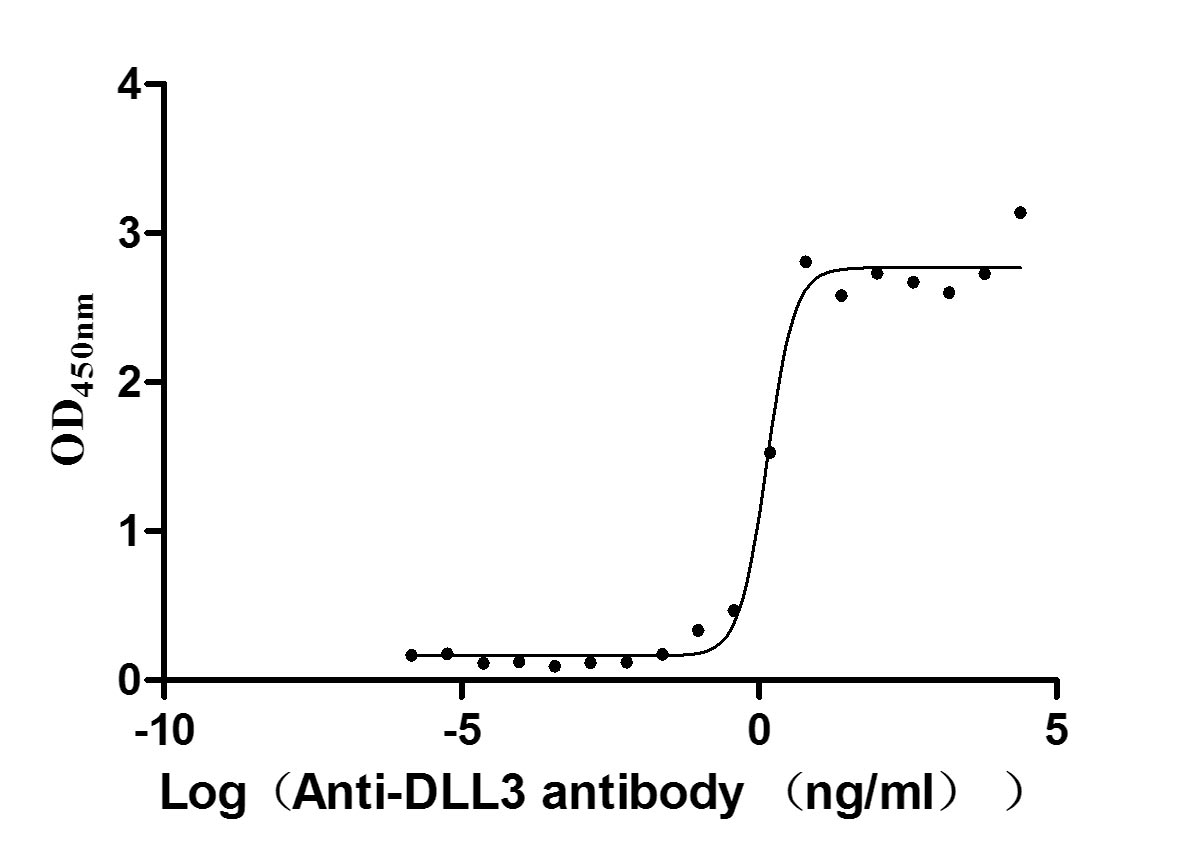
-AC1.jpg)
